Some people like deciding where to go at the drop of a hat, and this is what is so appealing about a holiday in a camper van. But just like any other holiday, it still requires some planning. Road trips around France in a van are becoming more and more popular. There’s no better feeling than waking up with a view of the dunes in the Landes or across the Alpine peaks. So follow this guide!
Choose a specialist hire company
In France, specialist van hire companies can provide you with a top-quality service (fully comprehensive insurance cover, recent vehicles that are kept in good condition, etc.). Some of the most well-known companies are Blacksheep, We Van and Van-Away.
- Good to know: some hire companies offer unlimited mileage, others don't. Some allow a second driver free-of-charge, for others this is an extra option that will cost you more, etc.

Another option is to hire from a private individual (or a car-sharing scheme)
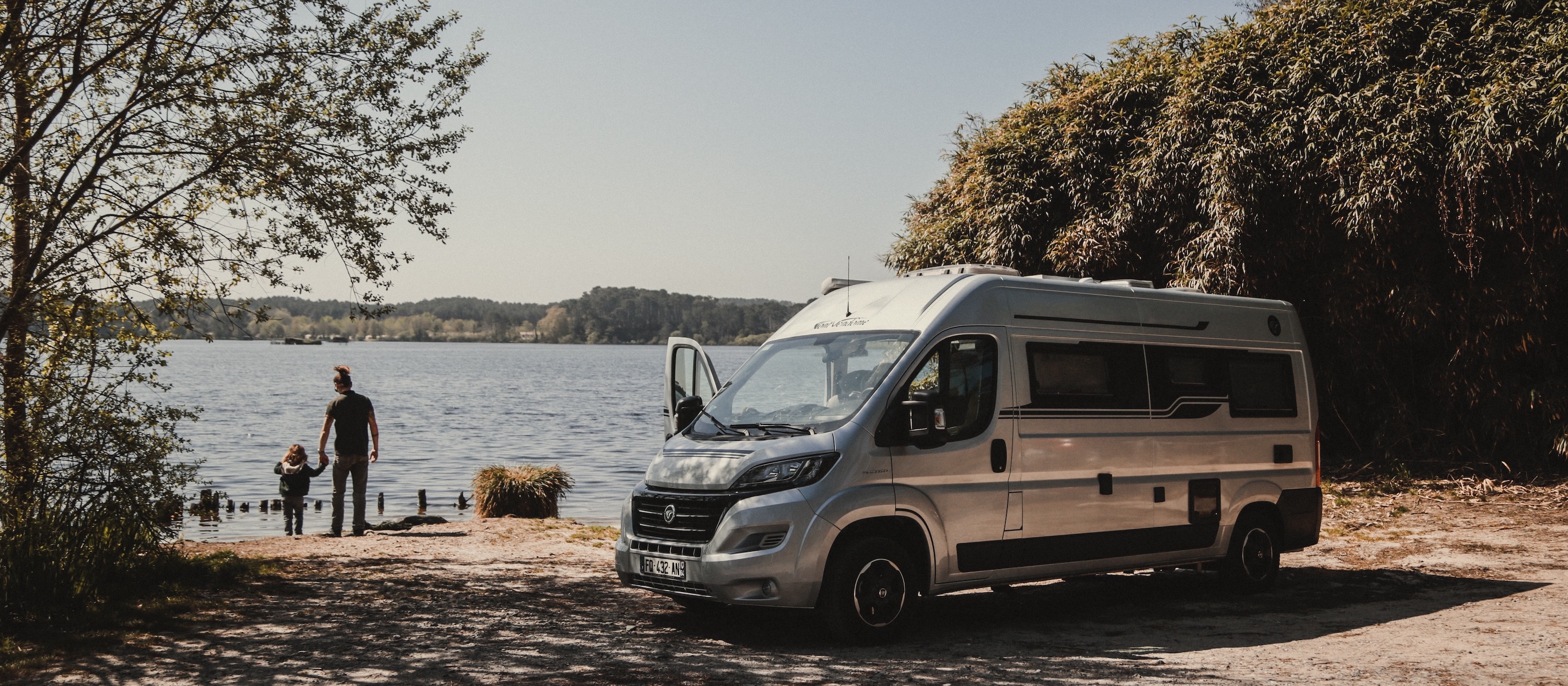 © Wikicampers – Travelling around the Landes in Seignosse
© Wikicampers – Travelling around the Landes in Seignosse
Wikicampers, Yescapa, Ouicar... Private van owners usually offer their vehicles for hire via one of these platforms, which also takes care of the management, security, insurance cover and deals with the transactions between the owner and holidaymaker.
The advantage of this option is that the rental price is usually more competitive. The condition of the vehicle is usually checked via the platform application, in your presence. Another top tip: if you are looking to try out a vehicle because you’d like to buy one, it would probably be easier for you to find the right model if you go through a specialist hire company. Last but not least, this is the most eco-friendly option because you won’t be hiring a van from a fleet that is only used for rental purposes.
Choose the right van that is suited to your needs
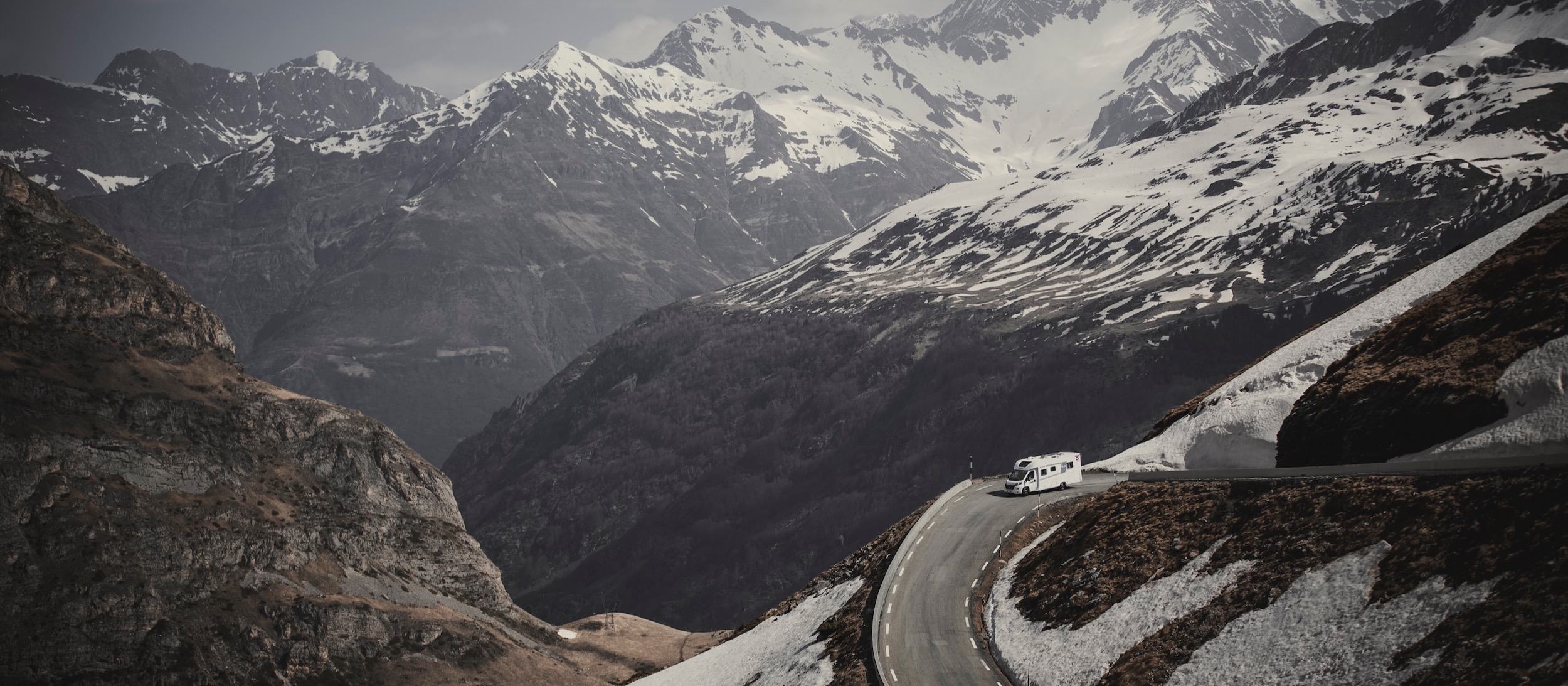 © Wikicampers – A camper van on the road through the Pyrenees
© Wikicampers – A camper van on the road through the Pyrenees
A combi van, utility vehicle or a pop-top camper van? An over-cab or low-profile motorhome? For every trip, there is a perfect van. Before setting off, make sure you take the time to choose the right vehicle for the number of people and with the right level of comfort to suit your needs.
Choosing a van with or without toilets might seem like an amusing detail, but it could make a big difference to your trip. And insulation and heating would be important factors to consider in winter.
A van adapted to off-road terrain would be better suited to trips off the beaten track than a motorhome that is more difficult to manoeuvre. In some vans you can stand up, in others you can't. This might seem insignificant for some travellers, but for others it would make a big difference.
Download useful applications
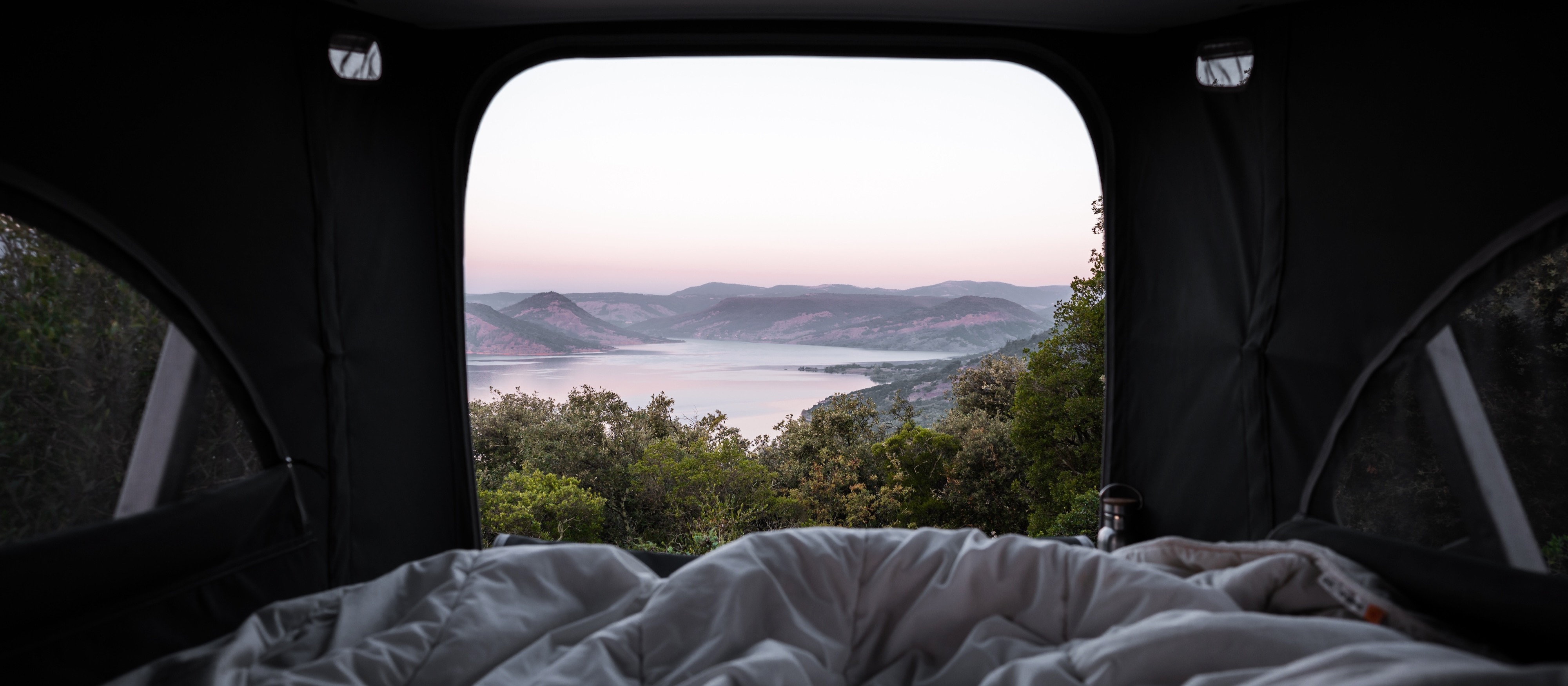 © Vanlifegoeson x WeVan – Room with a view of Salagou lake at the heart of the French department of Hérault
© Vanlifegoeson x WeVan – Room with a view of Salagou lake at the heart of the French department of Hérault
Any seasoned fan of the van life will tell you that the top priority is finding the perfect place to sleep. There’s no better feeling than waking up with a view of the dunes in the Landes or the Alpine peaks to start off your day with a smile. In France, some destinations are more welcoming than others when it comes to camper vans and motorhomes. Wild camping is subject to regulations.
In the Basque Country or Brittany, you might not always be able to stay overnight along the coast for free, especially during the peak season. Don’t panic, wherever you are, there’s always a plan B. Use the Park4night application to find an authorised parking area near you. It was designed specifically with this use in mind. Use the filter to search for the type of location you’re looking for (campsite, staying with the locals, free parking area, rest area, etc.). You’ll find plenty of useful reviews to get an idea of these locations before choosing one, and many of the reviews include photos. You can get any extra information you might need from maps.me and Google maps, and these applications will also help you if you want to venture off the beaten track.
- Top tip: choose the locations that have been given the least number of reviews. If you are looking for some peace and quiet, opt for a parking area that is at the departure point of a hiking trail, rather than alongside a busy road. It’s often a good idea to spend the night away from the main roads.
Plan your route
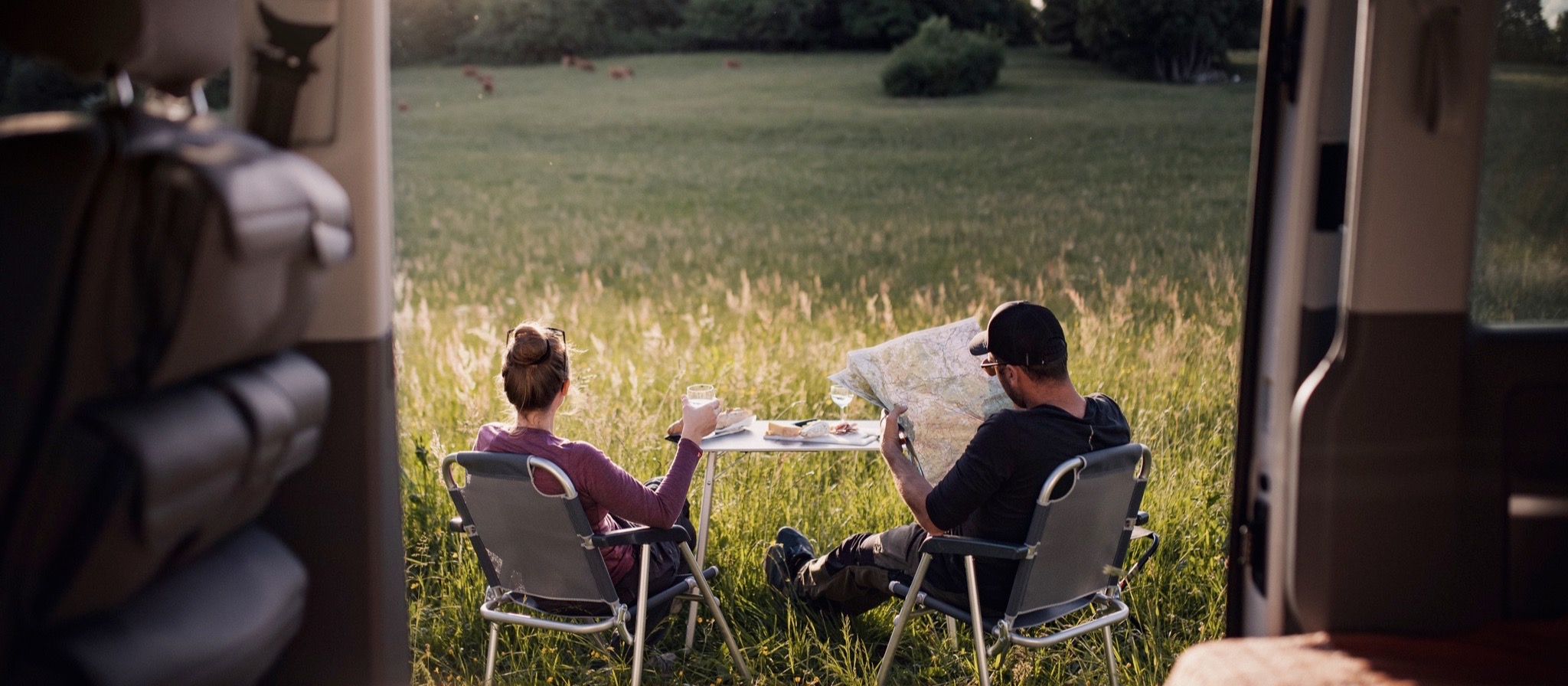 © Atypix x WeVan – Planning the route in a field in the Haut-Doubs
© Atypix x WeVan – Planning the route in a field in the Haut-Doubs
Just like your luggage, the route needs to be as simple as possible. The advantage of a road trip in a camper van is the freedom it gives you. You don’t need to plan the entire route out in advance but you can use the apps we’ve mentioned to decide on the mileage you’re aiming for each day. As a general rule, try not to plan too many miles on your road trip in France. A good indication is to spend around 2-3 hours on the road each day. This will limit fatigue. And you’ll have more time to make the most of a place you’d like to explore. There’s nothing like changing your plans to suit your needs, and adapting to the weather!
Be aware of the basic rules
On a trip in a camper van in France, you’ll be embarking on a whole new experience, where you are free to travel around as you please. But this independence does not mean you need to be completely self-sufficient.
The number one rule to respect for a successful trip is to travel light. Leaving your belongings and your daily comfort behind you is all part and parcel of the experience. For example: choose to use backpacks and lightweight camping gear rather than suitcases and fancy camping equipment than is better suited to staying in one place. And you’ll be delighted to be reminded that the lighter the camper van, the less fuel you’ll consume!
Another basic rule is to respect the locals: avoid making excessive noise at night (this also applies to other tourists nearby) and leave your overnight locations exactly as you found them, i.e. clean. It’s all about being respectful. For example, you should avoid using parking areas that are used by the locals to do their shopping, or those used by holidaymakers to go to the beach during the day.
Other useful precautions include being aware of any regulations regarding forest fires. A campfire might add a magical touch to your experience, but in France, you are not permitted to light fires in a national park, a protected nature reserve or in forests during the summer or in periods of drought. In any case, if you are not sure of the rules, it is better to avoid lighting fires.
Take what you need for the vehicle with you
 © Vanlifegoeson x WeVan / Preparing lunch in a camper van
© Vanlifegoeson x WeVan / Preparing lunch in a camper van
If you hire your vehicle from a professional company, chances are you won’t have much to think about, if anything at all (read the following paragraph). Pretty much everything you need for cooking will be provided. You’ll also most likely be provided with bed linen, a camping table and chairs (make sure you check before setting off).
The most organised of travellers will bring a toolbox, engine oil, a piece of cloth to wipe your hands after checking the oil levels (when the engine is cold and the ignition is switched off), a small air compressor for the tyres, etc. But with the breakdown cover, you’re not likely to need any tools whatsoever!
A checklist of the essentials you’ll need:
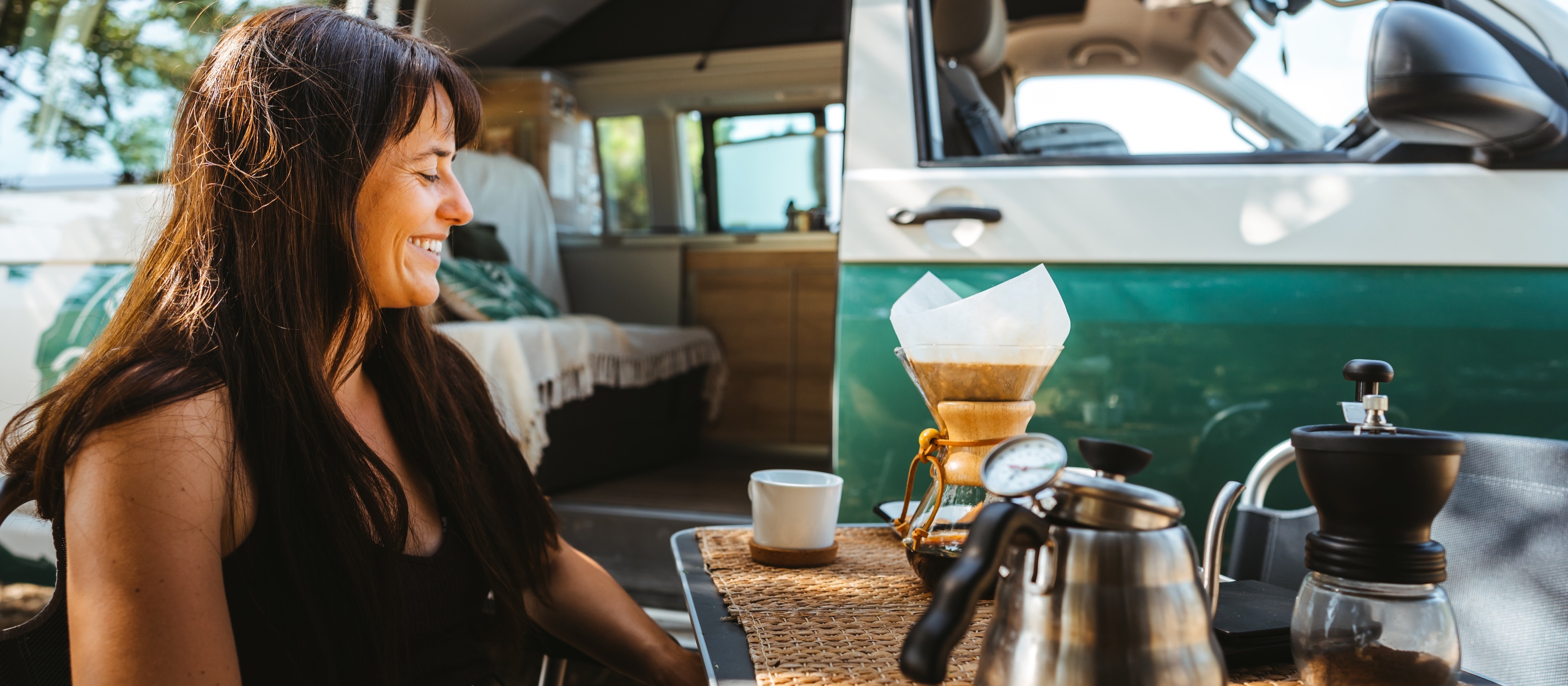 © Vanlifegoeson x WeVan / Well-equipped to make coffee in the great outdoors
© Vanlifegoeson x WeVan / Well-equipped to make coffee in the great outdoors
Paper versions of a travel guide and road map, a Swiss army knife, a camping stove, USB chargers and plug strips, plenty of water, solar- or battery-powered torches, head lamp, hammock, microfibre towel, Tupperware boxes and containers, bin bags, etc.
Are you still with us? If so, that means you’re ready to set off on the roads of France for your first trip in a camper van. All that’s left for us to do is wish you “Bon voyage”!
- Tips and suggestions:
Are you planning on travelling in an electric van? You'll need to find out how far you can go with a full charge. Depending on the model, this can vary from a hundred kilometres to almost 800 km, which would have a huge impact on how you plan your trip and your route in the camper van.
There are plenty of tools you can use to plan your route, and they will suggest the best places to stop and charge your vehicle along the way: A Better Route Planner or Charge Map.
To benefit from an overnight charge, opt for campsites with electric charging terminals. This is the ideal solution so you don’t need to worry about it overnight.
Getting around the local area by bike is always a good idea, especially if you are staying on a campsite or with the locals. If you’re planning on cycling, you’ll need a bike rack. This can be booked as an option from your hire company
Further reading :
Insolite : 6 écrins de verdure pour jouer les Robinsons modernes

By Alicia Munoz
Alicia, a journalist with a passion, writes about sustainable development, the environment and travel. Her love of nature, sports activities and the great outdoors becomes obvious in her articles.








